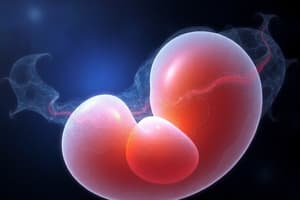Podcast
Questions and Answers
What is the region where water first accumulates to supply a stream called?
What is the region where water first accumulates to supply a stream called?
- Watershed
- Headwaters (correct)
- Stream channel
- Mouth
What term describes the narrow pathway carved by moving water into sediment or rock?
What term describes the narrow pathway carved by moving water into sediment or rock?
- Stream channel (correct)
- Gully
- Stream bank
- Erosion path
What is headward erosion?
What is headward erosion?
- The creation of stream channels by human activity
- Erosion at the beginning of a stream that affects upstream areas (correct)
- When a stream widens as it flows downstream
- The process of sediment deposition at the stream mouth
What process occurs when one stream captures the water from another?
What process occurs when one stream captures the water from another?
What represents the slope of a stream channel?
What represents the slope of a stream channel?
What is the base level of a stream?
What is the base level of a stream?
What can result from the process of stream capture?
What can result from the process of stream capture?
How do freshwater lakes and wetlands primarily form?
How do freshwater lakes and wetlands primarily form?
What is the primary composition of alluvial fans?
What is the primary composition of alluvial fans?
Which feature forms at the point where a stream enters a large body of water?
Which feature forms at the point where a stream enters a large body of water?
What happens during the process of rejuvenation in a stream?
What happens during the process of rejuvenation in a stream?
Natural lakes can form when which of the following occurs?
Natural lakes can form when which of the following occurs?
What type of lakes have glacial origins?
What type of lakes have glacial origins?
Which of the following describes alluvial fans?
Which of the following describes alluvial fans?
What is a key characteristic of delta deposits?
What is a key characteristic of delta deposits?
Which of the following scenarios would likely lead to the formation of a moraine-dammed lake?
Which of the following scenarios would likely lead to the formation of a moraine-dammed lake?
What factor primarily determines the downcutting energy of a stream?
What factor primarily determines the downcutting energy of a stream?
Where in a meander does the water experience the greatest velocity?
Where in a meander does the water experience the greatest velocity?
What commonly forms when a stream cuts off a meander?
What commonly forms when a stream cuts off a meander?
What occurs along the inside of a meander due to slower water movement?
What occurs along the inside of a meander due to slower water movement?
What happens to sediment transport when streams lose velocity?
What happens to sediment transport when streams lose velocity?
How do meanders become more pronounced in a stream?
How do meanders become more pronounced in a stream?
What is the main consequence of water moving faster on the outside of a meander?
What is the main consequence of water moving faster on the outside of a meander?
Which of the following processes takes place as a stream flows along a meander?
Which of the following processes takes place as a stream flows along a meander?
What primarily determines the longevity of a lake?
What primarily determines the longevity of a lake?
Which of the following best defines a wetland?
Which of the following best defines a wetland?
Which type of wetland receives its water primarily from precipitation rather than streams?
Which type of wetland receives its water primarily from precipitation rather than streams?
What role do wetlands play in environmental health?
What role do wetlands play in environmental health?
What type of wetland is characterized by having larger plants and often being located near streams?
What type of wetland is characterized by having larger plants and often being located near streams?
How has the area of wetlands in the United States changed since the 1980s?
How has the area of wetlands in the United States changed since the 1980s?
What types of environments are typically classified as freshwater wetlands?
What types of environments are typically classified as freshwater wetlands?
What is a common misconception about bogs?
What is a common misconception about bogs?
Flashcards
Headwaters
Headwaters
The area where water first collects to form a stream.
Stream Channel
Stream Channel
The narrow pathway carved by flowing water into sediment or rock.
Headward Erosion
Headward Erosion
The process where a stream erodes the land at its head, extending its length.
Stream Capture
Stream Capture
Signup and view all the flashcards
Stream Gradient
Stream Gradient
Signup and view all the flashcards
Base Level
Base Level
Signup and view all the flashcards
Stream's Energy Source
Stream's Energy Source
Signup and view all the flashcards
Lake and Wetland Formation
Lake and Wetland Formation
Signup and view all the flashcards
Stream Meander
Stream Meander
Signup and view all the flashcards
Meander Erosion
Meander Erosion
Signup and view all the flashcards
Meander Deposition
Meander Deposition
Signup and view all the flashcards
Oxbow Lake
Oxbow Lake
Signup and view all the flashcards
Stream Downcutting
Stream Downcutting
Signup and view all the flashcards
Stream Velocity
Stream Velocity
Signup and view all the flashcards
Sediment Deposition
Sediment Deposition
Signup and view all the flashcards
Stream's Energy
Stream's Energy
Signup and view all the flashcards
Alluvial Fan
Alluvial Fan
Signup and view all the flashcards
Delta
Delta
Signup and view all the flashcards
Stream Rejuvenation
Stream Rejuvenation
Signup and view all the flashcards
Lake Formation (Sediment)
Lake Formation (Sediment)
Signup and view all the flashcards
Lake Formation (Glacial)
Lake Formation (Glacial)
Signup and view all the flashcards
Natural Lakes
Natural Lakes
Signup and view all the flashcards
Lake Formation (General)
Lake Formation (General)
Signup and view all the flashcards
Stream's Deposition
Stream's Deposition
Signup and view all the flashcards
Lake Formation
Lake Formation
Signup and view all the flashcards
Freshwater Wetland
Freshwater Wetland
Signup and view all the flashcards
Bog
Bog
Signup and view all the flashcards
Marsh
Marsh
Signup and view all the flashcards
Swamp
Swamp
Signup and view all the flashcards
Water Quality Improvement
Water Quality Improvement
Signup and view all the flashcards
Wetland Loss (US)
Wetland Loss (US)
Signup and view all the flashcards
Temporary Lakes
Temporary Lakes
Signup and view all the flashcards
Study Notes
Stream Development
- Streams begin in headwaters, accumulating water from precipitation in gullies.
- Stream channels are the pathways carved into sediment or rock by moving water.
- Stream banks contain the flowing water.
- Headward erosion is when small streams erode the rock or soil at the head of a stream.
- Stream capture occurs when one stream cuts into another, diverting water.
- Stream valleys are formed by the energy of water moving down a slope (gradient).
- The stream gradient depends on the base level (elevation where it meets another stream or body of water).
Stream Valleys
- The height of a stream above its base level impacts its downcutting energy.
- Meanders are bends in stream channels caused by moving water.
- Water moving along the outside of a meander curve has the greatest velocity.
- Deposition occurs on the inside of a meander where water slows.
- Oxbow lakes form when a meander is cut off.
Deposition of Sediment
- Alluvial fans are fan-shaped deposits of sediment formed when water flows down steep slopes.
- Deltas are triangular deposits where streams enter large bodies of water.
- Deltas consist mainly of silt and clay particles.
Rejuvenation
- Rejuvenation is when a stream resumes downcutting to its base level.
- Downcutting increases flow velocity.
- Often caused by uplift of land surfaces above previous base levels.
Origins of Lakes
- Natural lakes form in low areas or depressions in surface land.
- Some form when streamflow is blocked by sediment.
- Other types of lakes, like moraine-dammed lakes, cirque lakes, and kettle lakes, develop from glacial activity.
Lakes Undergo Change
- Lakes are temporary features in most cases.
- The volume of water in a lake can change over time.
- Lakes can change through processes like eutrophication.
Freshwater Wetlands
- Wetlands are land areas covered with water for parts of the year.
- Common types include bogs, marshes, and swamps.
- Wetlands play a vital role in water quality improvement.
Eutrophication
- Eutrophication is the enrichment of water bodies with nutrients, leading to excessive plant growth.
- It can be sped up by excess nutrients in fertilizers.
Studying That Suits You
Use AI to generate personalized quizzes and flashcards to suit your learning preferences.




